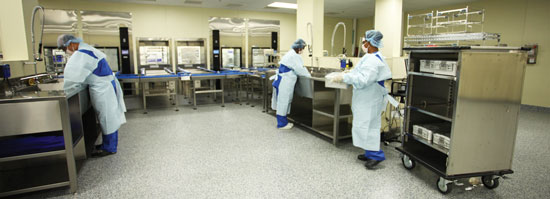
14 Jul Assessing the Sterile Processing Department
The Centers for Medicare and Medicaid Services (CMS) requires all health care facilities seeking CMS financial reimbursement to meet exacting “Conditions of Participation” standards for controlling infections. Within each facility, the Sterile and Materials Processing Department (also known as “sterile supply”) is responsible for ensuring that all medical and surgical equipment and supplies are properly cleaned, processed, sterile and stored to prevent infections and guarantee patient safety. Entities that participate in CMS programs must complete an extensive survey of their sterilization protocols and practices to receive CMS certification.
Functions of Sterile Supply
Sterile Processing Departments consist of four main areas, each of which focuses on accomplishing a specific goal within the sterilization process:
- The decontamination area cleans and decontaminates reusable equipment and materials through mechanical means (such as steaming) or the use of chemical disinfectants.
- Sterilization destroys the bacterial spores that cause infections. These spores are often highly resistant to destructive agents so care must be taken to match the sterilization agent to the pathogen and follow the appropriate protocol to ensure its eradication.
- Assembly and Packaging of Sterile Instrumentation – After sterilization, medical and surgical instructions are packaged into sets or trays relevant to their purpose. Both the packaging and the process of packaging must also be sterile to ensure continued cleanliness of the included materials or implements.
- Quality Assurance – Oversight of the sterilization process is required to ensure the effective and thorough sanitization of every instrument or equipment every time.
ICR Infection Assessments
The ICR Sterile Processing Department assessments aim at ensuring that your department will pass the CMS infection control survey and certification process. Every assessment includes a thorough evaluation of all aspects of the sterilization process including:
- contamination and infection risk assessments
- policy reviews to ensure compliance with current CMS standards, and
- education of key personnel to ensure they are adequately trained to perform appropriate sterilization practices.
Additionally, we tailor the assessments to the type of facility with which we are working. Ambulatory centers, hospitals, rehabilitation and even dental practices all have differing sanitation and sterilization practices and requirements. A comprehensive written report follows each assessment, which provides recommendations for improvement.
At ICR, we always align our practices with CMS conditions of participation and help our clients to do the same.
